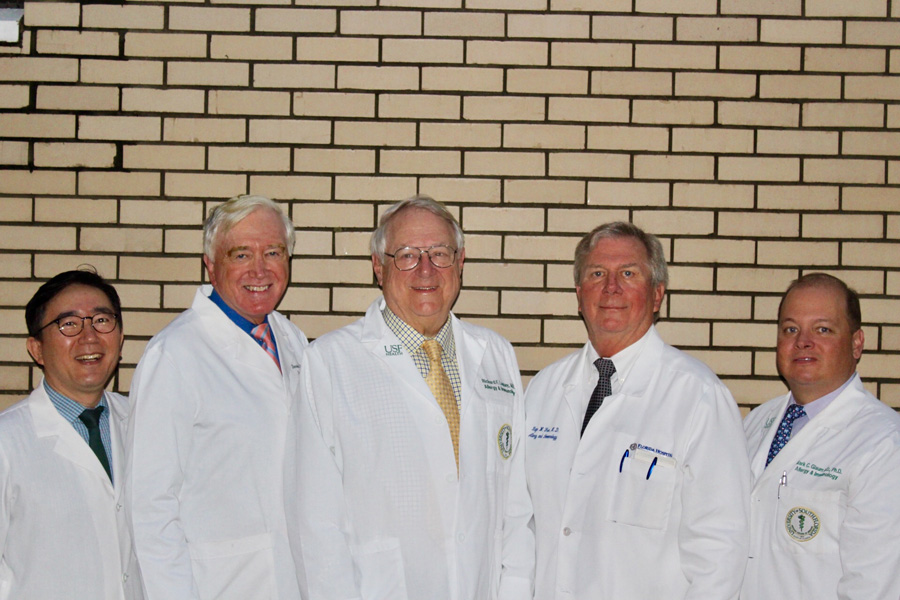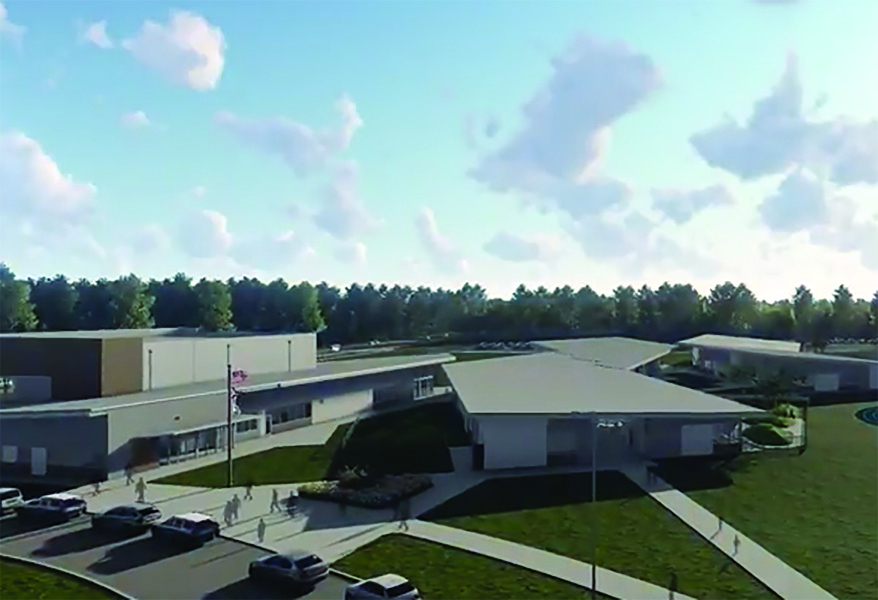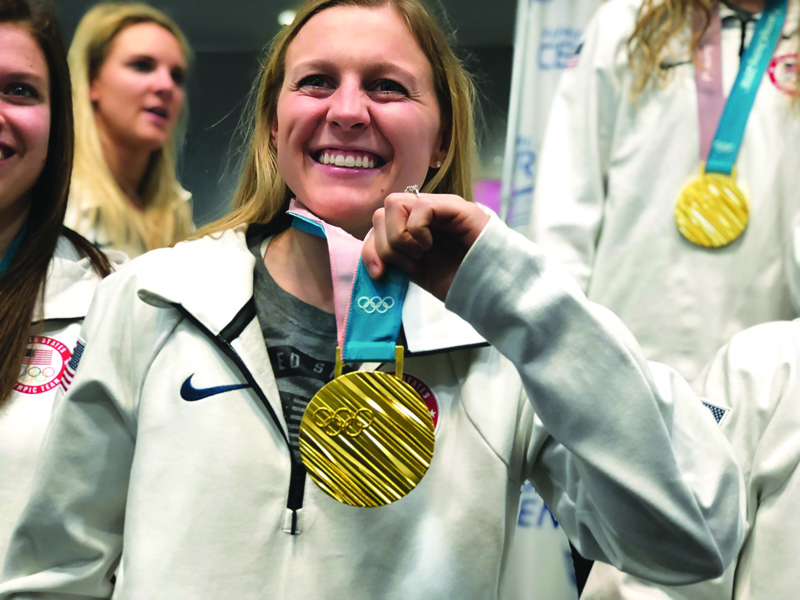
At a busy office on the top floor of a medical building near the corner of Fletcher Ave. and Bruce B. Downs (BBD) Blvd., a team of Board-certified allergists and immunologists both see patients and conduct research at the University of South Florida Division of Allergy & Immunology Clinical Research Unit next door. The practice recently opened an office in Wesley Chapel and now has five locations, including the main office on BBD Blvd. in Tampa, plus locations in South Tampa, Citrus Park and Brooksville.
Drs. Lockey, Fox, Ledford, Glaum and Cho make up the group that can be found online at AllergyTampa.com.
Richard Lockey, M.D., founded the practice in 1984 as Academic Associates in Allergy, Asthma & Immunology. He earned his medical degree from the Temple University College of Medicine in Philadelphia, PA. Dr. Lockey served in the U.S. Air Force during the Vietnam War, then subsequently joined the faculty of the University of South Florida College of Medicine (now Morsani College of Medicine) as a Professor of Medicine.
He currently is the director of USF’s Division of Allergy & Immunology. He also volunteers at the James A. Haley Veterans (VA) Hospital, where he was previously Chief of Allergy & Immunology.
Dr. Lockey also has served as a president of the World Allergy Organization and is a past president of the American Academy of Allergy, Asthma & Immunology (AAAAI), of which all of the practice’s specialists are members.
Roger Fox, M.D., earned his medical degree from St. Louis University School of Medicine in St. Louis, MO. He has written and lectured extensively on the topics of environmental, chemical, food and drug allergies, urticaria (hives) and skin disorders, such as angiodema.
Dennis Ledford, M.D., received his M.D. degree from the University of Tennessee Health Science Center in Memphis. Like Dr. Lockey, he also served as a past president of AAAAI. Dr. Ledford is the director of the Section of Allergy & Immunology at the James A. Haley VA Hospital. His published writings focus on immunology and autoimmune disorders and he has won many leadership awards. Dr. Ledford says he loves teaching medical students and educating patients. He was installed to the Gold Humanism Honor Society at USF.
Mark Glaum, M.D., PhD, earned his medical degree at Hahnemann University School of Medicine in Philadelphia, PA. He completed a fellowship in allergy and clinical immunology at the Hospital of the University of Pennsylvania, also in Philadelphia. His areas of interest include how the body responds to substances that cause allergic reactions and advancing diagnostic techniques, such as rhinoscopies (examining nasal passages with specialized instruments).
Seong Cho, M.D., received his medical degree as an otolaryngologist — an ear, nose and throat doctor — from Kyung Hee University School of Medicine in Seoul, South Korea. His allergy and immunology training was completed at Northwestern University, Feinberg School of Medicine, in Chicago, IL. He recently received a grant from the National Institutes for Health (NIH) in Bethesda, MD, studying pathogens and chronic rhinitis.
The physicians manage a variety of disorders related to allergy, asthma, and immunology, including rhinitis (inflammation and swelling of the mucous membrane of the nose, often referred to as hay fever), cough, laryngitis, headaches and immune disorders. The specialists also treat allergic reactions and immune responses resulting in rashes and dermatitis.
Research Benefits Patients
What sets Drs. Lockey, Fox, Ledford, Glaum and Cho apart from other groups is the relationship the doctors have with USF. With all five doctors also teaching students at USF’s Morsani College of Medicine, the patients they care for in private practice reap the benefits.
“There are advantages of being with physicians who have contact with the future in teaching residents,” says Dr. Ledford. “The process of educating makes you better.”
Dr. Ledford explains that all five doctors conduct research at USF’s Division of Allergy & Immunology Clinical Research, too. As a researcher, he says, “you’re aware of developments and where science is progressing.” He adds that his practice’s patients can gain access to studies when there are new therapeutic trials being conducted.
If a study is being conducted that could help a specific patient, the doctors can send that patient right down the hall to USF’s Clinical Research Unit to participate in the study. Dr. Ledford says that not only can that benefit the patient with medicine or techniques that may not be readily available in mainstream medicine, but also, “by participating in the study, our patients are helping to advance the field.”
Dr. Ledford explains that one such study is peanut immunotherapy, where extremely precise and tiny doses of peanuts are introduced to patients in a methodical way, to teach the body to tolerate them.
For someone who has a life-threatening allergy to peanuts, to be able to tolerate small amounts can relieve the constant fear of accidental contact with peanuts.
“It’s quite liberating,” Dr. Ledford says of the results of this technique, which is not yet mainstream but is available through his practice’s research partnership with USF.
He adds that this partnership allows his office to provide the convenience of neighborhood medicine, combined with the experience of the academic setting.
“It’s unusual,” Dr. Ledford says, “but Dr. Lockey has created a hybrid of a university clinic and a private practice. They complement each other.”
Sue Moore is a patient who says she has benefited from this approach. After conventional treatments for her asthma left her still “gasping for breath,” she says Dr. Ledford found a brand new treatment for her — one that has helped her breathe easy so that she no longer struggles with asthma symptoms.
“Dr. Ledford went beyond the norm to find a treatment that works,” Sue says. “He stays on top of his profession, continually doing research, and always has his patients at the top of his agenda.”
Sensitive To Pollen?
This is the time of year when seasonal allergies are at their worst.
“March is the peak of allergy season in Florida,” says Dr. Ledford. “In our area, people react to tree allergens — primarily oak and cypress — from about Christmas to Easter.”
Dr. Ledford says that for people who have moved to Florida from up north, spring happens much earlier, as trees start pollinating between January and April. So, allergy sufferers will notice that happening much earlier here than in colder climes.
To help the doctors assess the environment and know what allergens to test their patients for, “we sample the environment to see what’s there,” explains Dr. Ledford. He says air samples are gathered from the patient’s roof, then Dr. Glaum counts the pollen and other allergens under a microscope. He then provides those counts to the community on the practice’s website, AllergyTampa.com.
Now Open In Wesley Chapel
The Wesley Chapel office is open in the Seven Oaks Professional Park on Thursday mornings, beginning at 7:30 a.m., where patients can see Dr. Cho.
While the doctors and staff at the practice have considerable clinical and research experience, as well as access to the latest in treatments and technology, Dr. Lockey expresses a basic principle that guides his team in its work.
“We practice the most cost-effective and honest medicine,” he says. “We treat patients like they’re our family members. That’s what all medicine should be about.”
To learn more about Drs. Lockey, Fox, Ledford, Glaum and Cho, visit AllergyTampa.com or call (813) 971-9743. The New Tampa office is located at 13801 BBD Blvd., Ste. 502, and the Wesley Chapel office is located at 2106 Ashley Oak Cir., #102.











